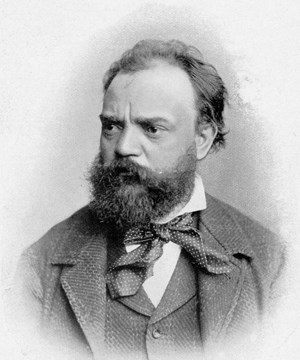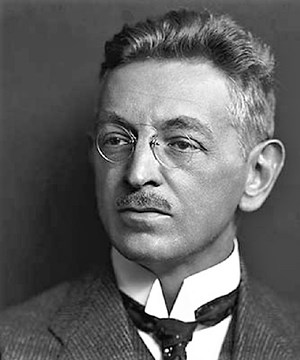About the Composer & Librettist
Vital Statistics
Born: September 8, 1841 in Nelahozeves, near Prague, Bohemia (now Czech Republic).
During Lifetime: Czech nationalists longed for independence from the Austrian Empire, which had ruled Bohemia for more than 300 years. This encouraged artistic expression of Czech folk traditions.
Biographical Outline
-
Training: Dvořák’s parents encourage his musical training despite their humble origins (his father was a butcher, innkeeper and zither player). Studying voice, violin, piano and viola along the way, Dvořák graduates second in his class from the Prague Organ School in 1859.
-
First gig: As violist in a dance band, which morphs into the Czech Theater orchestra, Dvořák is exposed to international operatic and symphonic repertoire. He also gives piano lessons, studying and composing on the side. He doesn’t go public as a composer until he is almost 30.
-
Operatic misstep, 1873: Dvořák’s opera, King and Charcoal Burner proves too difficult to perform, and hewrites an entirely new score, in the process rethinking his approach to composition in general, and destroying or rewriting many earlier works.
-
Influential friend, 1875: He applies for the yearly Austrian State Stipend for composers; on the jury is none other than Johannes Brahms. Brahms immediately likes what he sees of Dvořák’s music and becomes a fervent supporter, model, and friend. Brahms’ recommendations help garner an international audience for Dvořák.
-
Jackpot, 1878: Brahms’ publisher releases Dvořák’s Slavonic Dances for piano, four hands. It’s a huge success, and Dvořák becomes famous.
-
London calling, 1884-1896: Dvořák makes nine visits to England, where his choral and symphonic music enjoy a popularity unhampered by the anti-Czech attitudes in Austria and Germany.
-
Yankee fan. 1892-95: Lured by a fat salary offer, Dvořák heads to New York to lead the National Conservatory of Music. He earns a prominent place in American musical history through his teaching.
-
Multinational Music: Dvořák encourages his American students to seek out national traditions from Native-American and African-African sources. His own Symphony No. 9, “From the New World” (1893), commissioned by the New York Philharmonic, incorporates both Czech and American folk influences. Its premiere at Carnegie Hall is interrupted throughout with thunderous applause, and remains today one of the most popular orchestral works worldwide.
-
Last years: Homesick and owed money, Dvořák returns to Bohemia, where he enters a new compositional phase, writing symphonic poems and operas until his death at age 62.
Fun Facts
-
Romance: Dvořák ardently wooed his piano student, Josefina Čermáková to no avail. After she married someone else, Dvořák married her sister Anna, and they had nine children.
-
Jokester: According to Dvořák’s secretary Josef Kovřík, the composer scribbled “From the New World” on the title page of his last symphony just before it was sent to the publisher, meaning it as an “innocent little joke” equivalent to “Greetings!” The title, however, has stuck and spurred critics to analyze its real and imagined Americanisms.
-
Top of the Pops: The theme from the slow movement of Dvořák’s “New World” symphony was turned into a hit song, “Goin’ Home” by his student, San Francisco native William Arms Fisher in 1922.
-
Shut-in: Dvořák had a psychological condition that modern writers have diagnosed as agoraphobia. He was afraid to go outdoors alone. He didn’t even attend the first performance of his “New World” symphony, but was persuaded to attend the second.
Recommended Biography
- Curiously, the bookshelf is rather bare when it comes to good, complete accounts of Dvořák's life in English. The best biography is still from 1979, by the scholar John Clapham (Dvořák, London: David & Charles, out of print). So until a more authoritative source comes along, look up the article in the New Grove Dictionary of Music and Musicians (2nd ed. 2000), and the following:
- Kurt Honolka, Dvořák: His Life and Times, trans. by Anne Wyburd. Haus Publishing, 2005. A brief, reasonable introduction.
- David Hurwitz, Dvořák: Romantic Music's Most Versatile Genius. (Amadeus Press, 2006.)
- Michael Beckerman, New Worlds of Dvořák: Searching For the Composer's Inner Life (W.W. Norton, 2003). The foremost Dvořák scholar in America sums up his years of research on the composer's American period and comes up with some surprising conclusions.
Explore the Music
- Dvořák wrote a lot of music, and in all forms. He is most famous for his last three symphonies, his concertos for violin and cello, and several other orchestral pieces. However, his choral pieces, songs and chamber works have much to offer. Outside of his homeland, only Rusalka has gained a toehold in the international opera repertory. Dvořák’s melodic gifts have been likened to those of Schubert. His music is often enlivened by folk rhythms, alternating major and minor harmonies, and novel approaches to form.
Recommended Websites
- Wikipedia article on Dvořák
- Audio clips from the symphonies at the Czech Ministry of Culture
Recordings
- Symphonies
- Nos. 7-9: Czech Philharmonic / Václav Neumann (Supraphon, 2003)
- Nos. 7-9: Cleveland Orchestra/ George Szell (Sony Masterworks Heritage, (1998)
- Nos. 8-9: Berlin Philharmonic / Rafael Kubelik (DG, 1996)
- Nos. 8-9: Budapest Festival Orchestra/ Ivan Fischer (Philips, 2001)
- No. 9: Czech Philharmonic/ Karel Ancerl (Supraphon, 2002)
- No. 9: New York Philharmonic/Kurt Masur (Teldec 2002) Includes Slavonic Dances.
- No.6: Czech Philharmonic/ Jiri Belohlávek (Chandos, 1994)
- Nos. 4-6: Czech Philharmonic/ Václav Neumann (Supraphon, 2003)
- Tone Poems:
- These four brilliant, colorful works were written in 1896, based on Czech folk legends.
- Berlin Philharmonic Orchestra/ Simon Rattle (EMI, 2005)
- Slavonic Dances (orchestral arrangement)
- Czech Philharmonic/ Charles Mackerras (Supraphon, 2005)
- Other orchestral:
- Symphonic Variations, Op. 78, Scherzo Capriccioso, Op.66, Legends, Op. 59: Czech Philharmonic/ Charles Mackerras (Supraphon, 2002)
- Legends: English Chamber Orchestra/ Rafael Kubelik. With the Stabat Mater (DG Double, 1997).
- Serenade for Strings; Czech Suite: Prague Chamber Orchestra (Supraphon, 2004)
- Dvorak’s Cello Concerto is the most famous of all music written for this instrument.
- Mstislav Rostropovich/ Berlin Philharmonic/ Herbert von Karajan (DG, 1996)
- Jean-Guilhen Queyras/ Prague Philharmonic/ Jiri Belohlavek (Harmonia Mundi France, 2005). Coupled with: Trio in E Minor, Op. 90 (“Dumky”)
- Violin Concerto:
- Maxim Vengerov/ New York Philharmonic/ Kurt Masur (Teldec, 2001)
- Chamber music:
- String Quartet No. 12, Op. 96 “American”; String Quartet No. 13, Op. 106: Vlach Prague Quartet (Naxos, 1996).
- Trio No. 4 in E Minor, Op. 90 “Dumky”; Trio No. 3 in F Minor, Op. 65 (Supraphon, 2006).
Jaroslav Kvapil (25 September 1868 in Chudenice, Kingdom of Bohemia – 10 January 1950 in Prague) was a Czech poet, theatre director, translator, playwright, and librettist. From 1900 he was a director and Dramaturg at the National Theatre in Prague, where he introduced plays by Anton Chekhov, Henrik Ibsen and Maxim Gorky into the repertory. Later he was a director at the Vinohrady Theatre (1921–1928). He wrote six plays, but is today chiefly remembered as the librettist of Antonín Dvořák's Rusalka.[1]
Kvapil was the principal author of the Manifesto of Czech writers of 1917, signed by over two hundred leading Czechs, favouring the concept of Czech self-government.[2]
He was married to actress Hana Kvapilová from 1894 until her death in 1907.
(Source: Wikipedia)
To learn more about the librettist of this magical opera, check out Jaroslav Kvapil's astrological birth chart.


